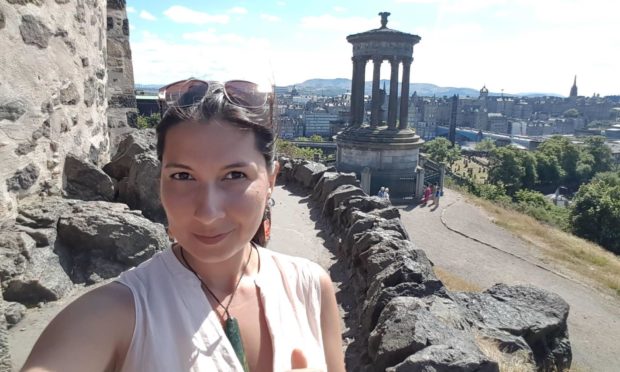- The Courier is a proud partner in the Pass the Mic media project, a new platform which aims to raise the profiles of women of colour in Scotland and give a voice to their expertise. The project was founded in 2019 and works with the women and organisations behind Gender Equal Media Scotland with support from Women 50:50. We will be working with a number of commentators based in Tayside and Fife starting today with Dr Niki Khan. Niki grew up in Fiji, and now splits her time between Scotland and England, Covid-19 permitting. She is a lecturer in animal science at Nottingham Trent University and visiting scholar at St Andrews University, specialising in how animals respond to environmental stress.
My favourite part of teaching is seeing students discover something that piques their interest. They lean forward, their faces light up with awe, astonishment, empathy, or a myriad of other reactions.
Covid has robbed the teaching profession of some of this. I lecture a sea of profile pictures. When one of my students waved at me, on campus, in real life, I had no idea who he was. I knew him only from his initials on screen.
However, ignoring the obvious disadvantages and complexities of remote learning, there have been some silver linings to teaching in the time of Covid.
Silver linings
For my students with disabilities or chronic illnesses, the online and recorded lectures are a boon; they don’t need to get ready, commute, or try to concentrate if they are having a difficult day. They can listen to recorded lectures and class discussions days or weeks later – a far cry from my own undergraduate days, where you had to beg notes from friends if you missed a class.
Online lectures also have a dedicated text chat line that stays open during the lecture. While some students prefer to ask questions verbally, the chat line provides a veil of anonymity; shyer students may feel more comfortable communicating this way, and are emboldened to ask questions during the lecture – with other students sometimes answering and sparking debate.
Students debated with each other, digitally sparring, with occasional pleas for my interjection or opinions.”
For example, I opted to run an online discussion on genetic engineering. I was a new lecturer at this institution, and the students didn’t know me; I prayed that they would engage, and I wouldn’t be sitting alone with the sound of silence ringing in my ears. Instead, using a combination of text and verbal speech, thoughts and questions came thick and fast- almost too fast for me to keep up with. Students debated with each other, digitally sparring, with occasional pleas for my interjection or opinions.
Despite the derogation of lecturers and teachers during the pandemic, we have stepped up to continue to deliver compelling learning in ways we haven’t been trained for, in rapidly changing circumstances.
Extraordinary things
Colleagues far more talented than I are doing extraordinary things- creating video games, 3D models of dissections, and simulated laboratories. With teaching remaining online worldwide for the foreseeable future, we are faced with a unique opportunity to expand the curriculum to ensure our students are collaborative, empathetic global citizens.
There is a Zulu saying, ‘Umuntu ngumuntu ngabantu’, or ‘I am because we are’. Ubuntu is a nebulous concept that describes our collective humanity; one can only grow through the growth of others.
With our work existing largely online, we can, with minimal cost, create a more globally informed curriculum. Now is our chance to provide our students with the opportunity to hear from, and speak with, experts beyond the UK- a practice previously prohibitively expensive.
Ubuntu is a nebulous concept that describes our collective humanity; one can only grow through the growth of others.”
The acceptance of Zoom and Teams in teaching allows for first-hand accounts of ecosystem management, conservation practices, scientific research, and to understand and appreciate the subtleties of context dependencies from around the world. My students will hear about guineafowl in Ghana, bats in Belize, fish in Fiji, and learn about traditional and Indigenous knowledge.
With Brexit pulling us away from our friends and allies in the EU, we are at risk of being a nation of insular navel gazers. The loss of the Erasmus scheme, from which so many students benefitted, is a violation of Ubuntu; it makes us less than we could otherwise be.
But with free movement within the EU taken away, online learning is – surprisingly- stepping up to the plate.
Covid-19 will not last forever, and my hope is that we will all learn from this experience.”
The explosion of online conferences, webinars, and remote learning opportunities are opening previously unexplored international avenues to our students, even if their opportunities to travel to them have become more limited.
Covid-19 will not last forever, and my hope is that we will all learn from this experience. Covid-19 has shown us that we must work together to have any hope of progress; indeed, the Covid-19 vaccine is a triumph of global cooperation.
Spirit of Ubuntu
The only way we can progress is if we understand each other, and broadening our perspective is an essential part of this.
We need our youth to be better than us, to do better than we did.
Without the spirit of Ubuntu within us, we cannot implement change in our society.
This pandemic has reminded us of the need to think globally, and we can, indeed must, embed this thinking in our classrooms.
This pandemic has reminded us of the need to think globally, and we can, indeed must, embed this thinking in our classrooms.”










